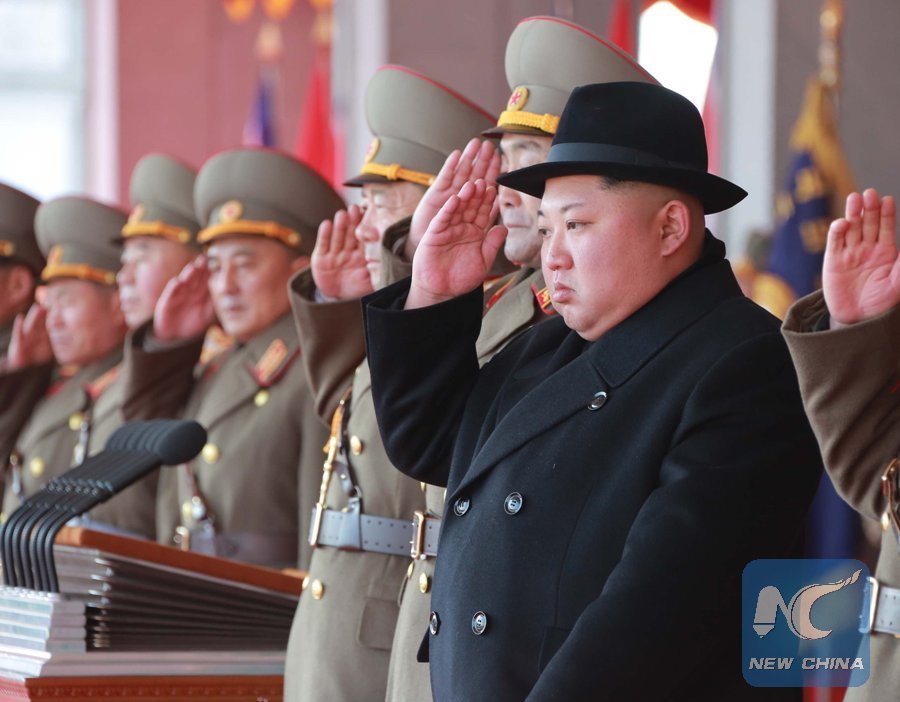
Cheerleaders from the Democratic People's Republic of Korea (DPRK) cheer before the preliminary match of women's ice hockey between Switzerland and the unified team of DPRK and South Korea at the Pyeongchang 2018 Winter Olympic Games at the Kwandong Hockey Centre in Gangneung, South Korea, on Feb. 10, 2018. (Xinhua/Wang Song)
WASHINGTON, Feb. 22 (Xinhua) -- A canceled high-level meeting between Washington and Pyongyang and the looming U.S.-South Korean annual military drills may have dampened the recently generated positive momentum on the Korean Peninsula, U.S. experts on international relations have said.
U.S. Vice President Mike Pence was set to meet with officials from the Democratic People's Republic of Korea (DPRK) during the Winter Olympics in South Korea but Pyongyang canceled the meeting, U.S. media reported Tuesday, citing Pence's office.
For Pyongyang, "it would be a major step for any Kim family member to meet with Pence ... They likely canceled because of Pence's recent comments about sanctions," Troy Stangarone, senior director with the Washington-based Korea Economic Institute, told Xinhua.

Photo taken on April 11, 2017 shows a military vehicle during the U.S.-South Korea joint Exercise Operation Pacific Reach in Pohang, South Korea. (Xinhua/Lee Sang-ho)
Pence threatened to slap the "toughest and most aggressive" sanctions on the already weakened DPRK three days before his planned Feb. 10 meeting with Kim Yong Nam, president of the Presidium of the DPRK Supreme People's Assembly, and Kim Yo Jong, the younger sister of DPRK leader Kim Jong Un.
"It will be hard to establish mutual talks between the U.S. and North Korea (DPRK) as America increases sanctions and tightens the pressure on North Korea," Brookings Institution Senior Fellow Darrell West told Xinhua, adding that it will aggravate Pyongyang and decrease the odds of talks.
The U.S. side might see the meeting as a good opportunity to convince the world that the U.S. position on Pyongyang was "not unreasonable and open to negotiation," yet "the (Trump) administration believes such talks will come only if there is maximum pressure," said Douglas Paal, vice president for studies at the Carnegie Endowment for International Peace.
In fact, on his way home from PyeongChang, Pence told a U.S. reporter that while keeping maximum pressure on the DPRK, the United States and South Korea agreed to further engage with Pyongyang.
Recent weeks have seen many examples of goodwill and brotherhood between the two Koreas as Pyongyang focused on its role in the Winter Olympics.
The DPRK has sent its athletes, cheerleaders and a high-ranking delegation to PyeongChang, showing its willingness to improve inter-Korean relations and ease tensions on the Korean Peninsula.
South Korean President Moon Jae-in also received Kim Jong Un's invitation letter, asking him to visit Pyongyang at a convenient time, which opened a possibility for the third inter-Korean summit meeting.

This picture provided by Korean Central News Agency (KCNA) on Feb. 9, 2018 shows the top leader of the Democratic People's Republic of Korea (DPRK) Kim Jong Un attending the military parade marking the 70th anniversary of the founding of Korean People's Army in Pyongyang, capital of the DPRK. (Xinhua/KCNA)
However, the schedule for the annual South Korea-U.S. war games, temporarily delayed due to the 23rd Winter Olympics and Paralympic Games, will be unveiled in mid-March, South Korea's defense chief said Tuesday.
The DPRK has condemned the resumption of the war games as a move that will escalate tension and threatened that it may cause "irrevocable consequences."
"We have to wait and see what the exercises look like. Some exercises can be very provocative and offensive," said Paal.
The DPRK will tell the world that they had reached out for peace yet the United States and South Korea turned them away, said Stangarone.

